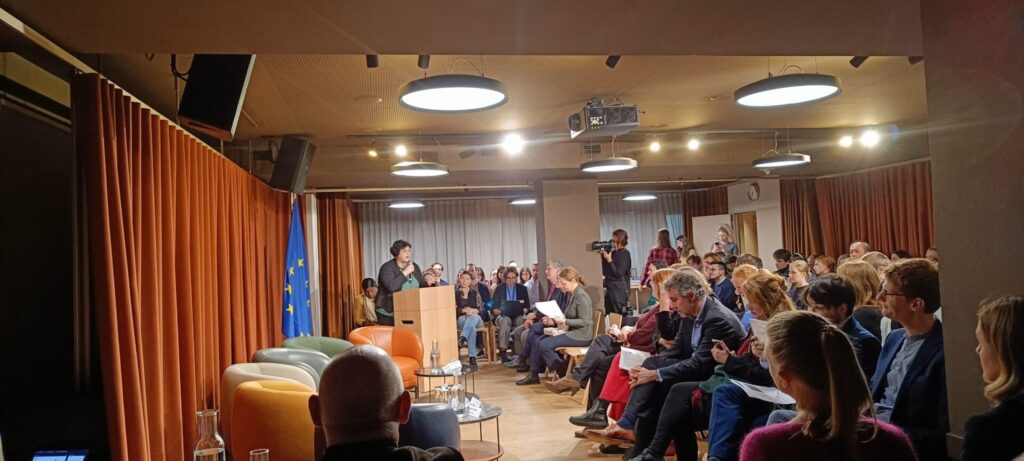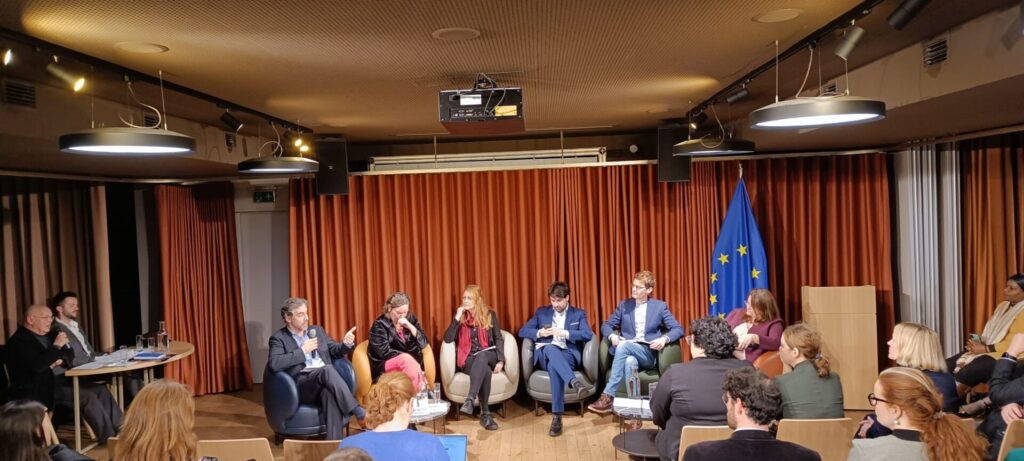European Roundtable – Turning the EPSR principles into practice
SOLIDAR held its European Roundtable 2024 on 12 February in the Austrian Permanent Representation to the EU, in Brussels. The event was co-organised with our partners Foundation for Progressive Studies (FEPS), Social Platform, AK Europa and the European Policy Centre (EPC) and was the occasion to launch our joint study titled “The Social Pillar and the Future of the EU Social Agenda” co-authored by Danielle Brady, Tommaso Grossi, Laura Rayner from EPC.
Opening remarks
The event was opened by Judith Vorbach, Head of AK Europa’s Brussels office, and by Laura de Bonfils, Secretary General of Social Platform. The first highlighted the crucial importance of the upcoming EP elections, pointing out that democratic principles may come under pressure, which will negatively impact the social agenda, as democracy is a precondition to social justice. Laura de Bonfils shared the urgency expressed by Judith Vorbach and mentioned another major risk represented by the return to austerity, which must be avoided at all costs to ensure the implementation of the EPSR.

Presentation of Policy study Shaping a ‘Shadow European Social Agenda
Tommaso Grossi, Researcher at EPC and co-author of the report presented the main findings of the study and the deriving policy recommendations. He first acknowledged the progress made in the last years under the Social Pillar’s framework. Secondly, he noted that based on the feedback given by EU and national-level civil society organisations through the survey, some improvements are still needed. At EU level it emerged that more coherence between different levels of governance including the European Semester and Economic Governance is necessary and that indicators and data collections should be improved. At the national level, social rights are still far from being a reality for too many people, as minimum income is not sufficient to lift people out of poverty in some countries and institutional discrimination and segregation jeopardises inclusion in other cases. After this, Tommaso Grossi presented a series of recommendations going forward including:
- mainstreaming an anti-discrimination and human rights-based approach in the next Action Plan;
- exempt social and green investment approved under RRF/EU finding programmes form deficit calculations;
- increase the allocation of funds to social programmes through the next MFF;
- involve CSOs and social partners in policymaking through structured and meaningful mechanisms.
People-centred approach Panel
The panel discussion titled “People-centered approach” was moderated by Aline Hoffmann, ETUI, and brought together EU and national level stakeholders to analyse the progress made so far and reflect of future avenues to fully implement the EPSR throughout the Union.
Fabien Dell, Head of Unit, European Commission, expressed satisfaction for the work done by the European Commission on the Action Plan of the Social Pillar and added that more will be needed in the future in terms of social initiative, as made clear by the acceleration in the digital and green transition. Agnes Jongerius, S&D MEP, brought in the perspective of the European Parliament, underlining its role in pushing forward the EPSR and its Action Plan. She also advocated for a permanent tool to tackle labour market issues, based on SURE. The MEP also highlighted the importance to ensure that ambitious social measures are announced in the first speech of the next Commission President. Tea Jarc, Confederal Secretary of ETUC, expresses her agreement with the findings of the study and stressed that a key objective of the implementation of the EPSR should be to counterbalance fiscal goals with social ones and avoid austerity at all costs, fighting among other issues, the cost-of-living crisis and in-work poverty. Francesco Corti, Advisor for the Belgian Minister of Social Affairs and Public Health pointed out that the implementation of the EPSR should respect the principles of subsidiarity and proportionality, and indicated the creation of the European Labour Agency as an example of successful action and an added value initiative under the Pillar. He also reminded that the role of EU social policies should be to fill in the gaps at national level and not replace member states’ role. Bjorn Hacker, Professor of Economic Policy at the University of Applied Sciences (HTW) Berlin, noticed that the EPSR itself is not questioned, but that it needs to have more binding force to have a real impact and awareness should be raised at national level on its key role.

After a few questions from the audience the speakers expressed their vision on the EPSR in a 10-year time. Fabien Dell noticed that in an ideal scenario, the EU remains the most competitive economy in the world, while meeting social objectives during the transitions. Agnes Jongerius called for a real implementation of the EPSR beyond “red washing”. Tea Jarc foresees a future in which the EPSR is embedded in the EU Treaties together with a Social Protocol. For Francesco Corti the Social Pillar will have been fully delivered in terms of labour mobility and working conditions, also through an improved public procurement framework. For Bjorn Hacker, the introduction of benchmarks linked to all 20 principles of the Pillar will help member states and regions to deliver on social objectives.
Conclusions
Lazlo Andor, FEPS Secretary General and former EU Commissioner for Employment, Social Affairs and Inclusion, concluded the discussions by stating that now this is the moment for the budget arm of the EU governance architecture to be strengthened to build innovative financial instruments that can help us make the EU more social through the upcoming transitions.


